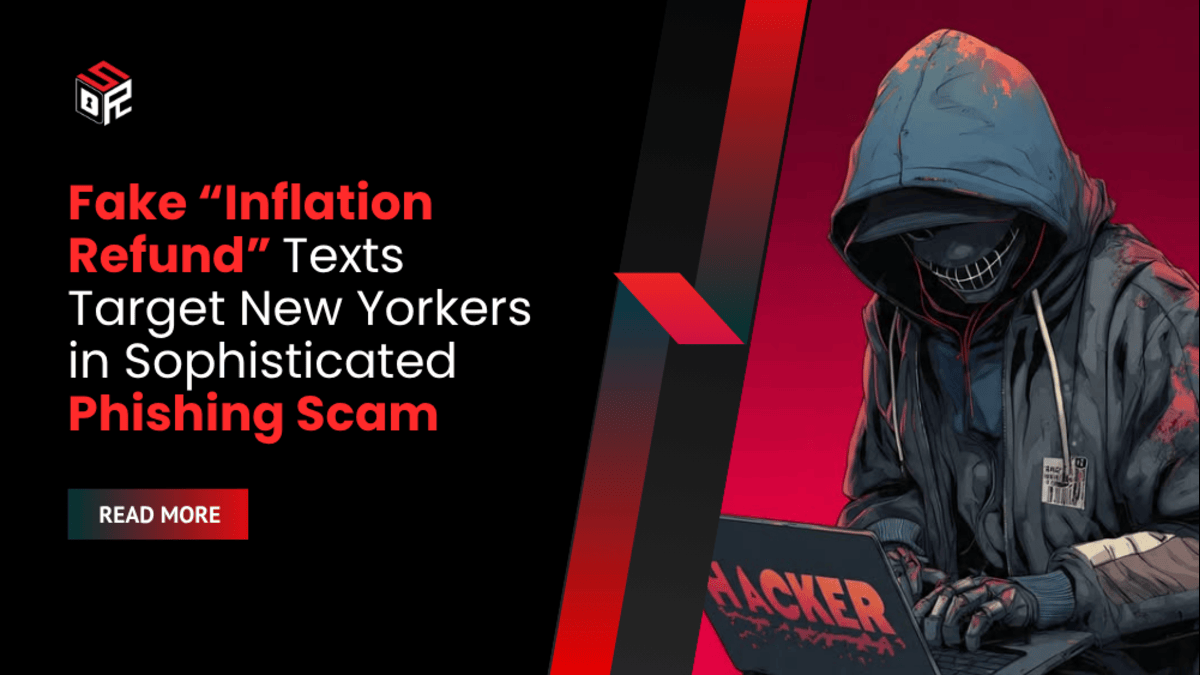A new phishing campaign is targeting residents across New York with fraudulent text messages promising fake “inflation refunds.” The scam, posing as a government relief program, directs recipients to malicious websites designed to steal personal data, including Social Security numbers, driver’s licenses, and bank account details.
The fraudulent texts typically read: “You are eligible for a state inflation refund. Click here to verify your eligibility.” Once users follow the embedded link, they are redirected to a convincing but fake government portal. There, they are asked to fill out personal information and upload identification documents, unwittingly handing over sensitive data to cybercriminals.
Phishing Campaign Exploits Economic Anxiety and Government Messaging
The ongoing campaign preys on public familiarity with economic relief programs discussed at state and federal levels. By mimicking the language and branding of government initiatives, attackers create a false sense of legitimacy that increases click-through rates and trust.
“This scam uses the same psychological hooks as legitimate relief efforts — urgency, authority, and financial relief — but with devastating consequences,” said a cybersecurity analyst familiar with the case.
Law enforcement agencies in New York have received dozens of complaints from residents who lost money or had their identities stolen. In some cases, victims were asked to pay a small “processing fee” via prepaid cards or cryptocurrency, only to later discover that no refund existed. Others had fraudulent bank or credit accounts opened in their names within days of submitting their data.
Authorities have noted that these texts often originate from spoofed or international numbers, making them difficult to trace. The messages are crafted to appear official, complete with state seals or department-style formatting. Many users fail to recognize the deception because the content references “inflation assistance,” a phrase commonly used in real government communications.
Attackers Steal IDs, Proof of Residence, and Financial Data
Investigators warn that the phishing websites used in this campaign are collecting a broad range of personal data beyond basic identifiers. Victims are asked to upload driver’s licenses, utility bills, or even selfies holding IDs to “verify eligibility.”
“Once attackers have this level of personal documentation, it’s not just about stolen money — it’s about stolen identity,” an official from the New York Department of Financial Services said.
The stolen information allows criminals to apply for loans, credit cards, or government benefits in the victims’ names. Some victims have also been tricked into installing fake “security verification” apps that grant remote access to their devices, enabling deeper breaches into personal files and communications.
State Officials Urge Residents to Remain Vigilant
New York authorities have issued public advisories urging residents to ignore unsolicited refund messages and to report suspicious texts immediately. They emphasize verifying any refund-related communication directly through official state websites rather than through SMS links.
“If you didn’t apply for a refund and receive a message about one, assume it’s a scam,” said a spokesperson from the New York Attorney General’s Office.
Officials recommend that anyone who interacted with the phishing site should monitor their credit reports, set up fraud alerts, and notify their banks. The state has also encouraged victims to file identity theft complaints with the Federal Trade Commission (FTC) and local law enforcement agencies.
Authorities are considering additional regulations to restrict mass SMS messaging by scammers and to establish clearer authentication standards for government communications. Legal experts warn that those caught running such campaigns could face felony identity theft and wire fraud charges under state and federal law.
The “inflation refund” scam is part of a wider pattern of phishing operations exploiting timely economic themes — from pandemic aid to tax rebates — to manipulate public trust. Experts say the surge in such scams underscores the need for better citizen awareness and more robust communication security frameworks at the state level.









